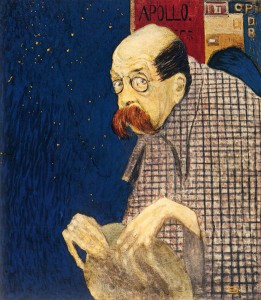 Britta McEwen is author of Sexual Knowledge: Feeling, Fact, and Social Reform in Vienna, 1900-1934, published earlier this year by Berghahn. Her work uncovers the transformation of sexual knowledge from the realm of specialized medical science to that of social reform for the wider populace. Here she discusses her work, some of the challenges she faced in writing about some of the key historical figures, and how she would utilize her apple pie making skills if she weren’t a historian.
Britta McEwen is author of Sexual Knowledge: Feeling, Fact, and Social Reform in Vienna, 1900-1934, published earlier this year by Berghahn. Her work uncovers the transformation of sexual knowledge from the realm of specialized medical science to that of social reform for the wider populace. Here she discusses her work, some of the challenges she faced in writing about some of the key historical figures, and how she would utilize her apple pie making skills if she weren’t a historian.
1. What drew you to the study of sexual knowledge in the early twentieth century?
I actually got into this field through architecture! Vienna has these amazing public housing projects from the interwar period, and as I investigated them I learned that they were intended for a new kind of people – upright, moral, hardworking small families. This seemed to entail a new sexual system, starting with birth control at the very least. That, combined with a well-timed read of Isabel Hull’s “Sexuality, State, and Civil Society in Germany,” made me think that there was a story to tell in Vienna’s early twentieth century about attitudes towards sex.
2. Did any perceptions on the subject change from the time you started your research to the time you completed the book?
On of my assumptions at the beginning of my project was that science was always a liberating voice vis-à-vis sexuality. While scientific discourse was used to challenge Church teachings about sex, I found that many authors in the early twentieth century were actually using melodramatic language, rather than scientific language, to express the call to sexual and social justice. At first I thought this was just a trick to popularize complex ideas, but as I went on I came to believe that melodrama offered people writing about sex a way to talk about ignorance, shame, and consequences in a way that would be convincing to a wide audience.
3. What aspect of writing this work did you find most challenging? Most rewarding?
I’ll answer that one by combining the questions and talking about what was both challenging AND rewarding… some of the historical characters I met in my research were so very colorful and compelling that they threatened to overshadow the “knowledge” they sought to impart. Here I’m thinking of Wilhelm Reich, Johann Ferch, and above all, Hugo Bettauer. Bettauer became a personal hero of mine as I wrote, which made it difficult to really focus on his journalism, rather than his person, for the book. In another world, I think I would have ditched the reams of research I had collected and simply written about Bettauer’s humanism and his outrageous career.
4. To what extent do you think the book will contribute to debates among academics within the field?
Although one of the arguments of my book is that Vienna was a special site for the production and distribution of sexual knowledge in the early twentieth century, I think it would be interesting to see comparative work done on this issue. How unusual were places like Vienna, Paris, and Berlin? What made them unique? I also wonder if books like mine will help dispel the belief that there was only one sexual revolution. Finally, the debate in the German-speaking world about the “repressive” sexual regimes of the twentieth century is really heating up, and I think books like mine will help contextualize what sexual “liberation” meant to different historical actors.
5. If you weren’t a historian, what would you have done instead?
Although I am a hardly an entrepreneur, I do think I might have been able to run a public space. Lord knows I waitressed enough to know a good cup of coffee when I see it, and I make a mean apple pie. So some days I fantasize about running a bookstore specializing in science fiction and mysteries, where you could get something sweet to eat and sit all day (just like in Vienna), reading and gabbing. I imagine it to be the kind of place with a bad pun in the title and a standing feminist knitting circle – come to think of it, the kind of place that could be lampooned on “Portlandia.”
Britta McEwen teaches European History at Creighton University in Omaha, Nebraska.
 Newly released titles from Berghahn’s history list:
Newly released titles from Berghahn’s history list:




